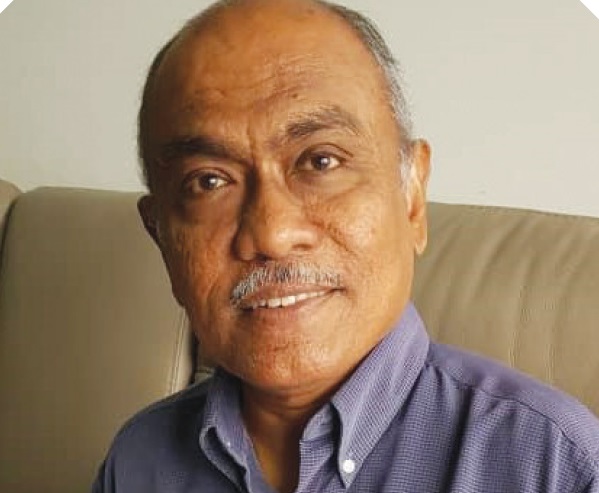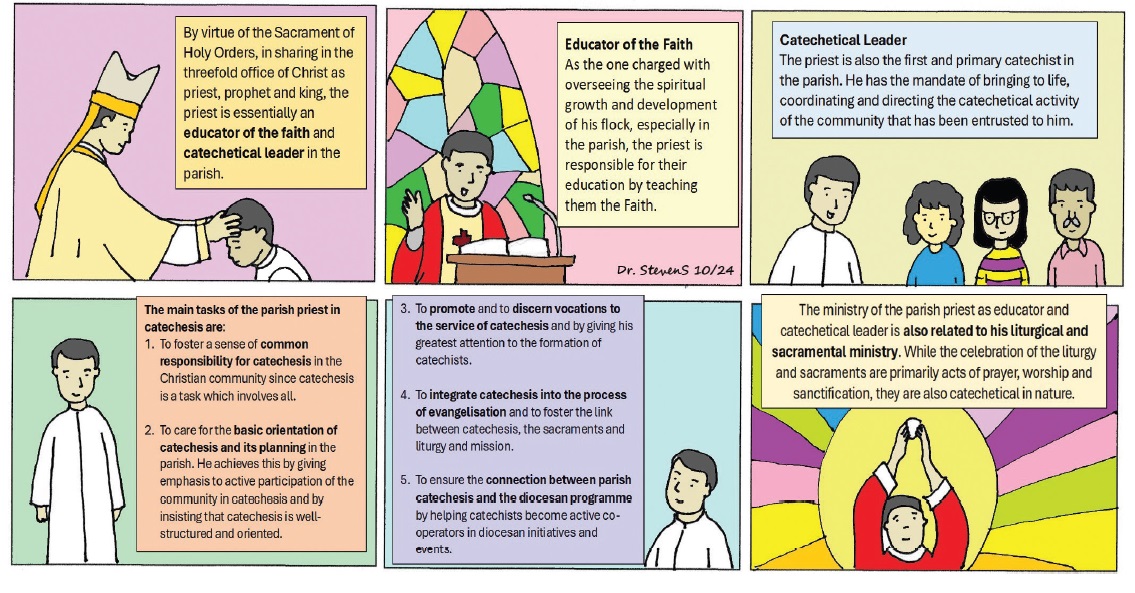The role of priests in catechesis
As with all the baptised, priests share in the common vocation to the ministry of catechesis.
Nov 15, 2024

Echoing the Faith - Dr Steven Selvaraju
As with all the baptised, priests share in the common vocation to the ministry of catechesis. However, by virtue of the Sacrament of Holy Orders, they have a more specific role to play. The role of priests, and in particular parish priests in catechesis, is clearly stated in the Church’s Magisterium and Canon Law. By sharing in the threefold office of Jesus Christ as priest, prophet and king, the priest is essentially an educator of the Faith and catechetical leader in the parish.
Educator of the Faith
The first and fundamental duty of the priest, as a collaborator with the bishop, is to instruct the faithful in the things of God. As the one charged with overseeing the spiritual growth and development of his flock, especially in the parish, the priest is responsible for their education by teaching them the Faith. As witnessed in the ordination ceremony, the bishop in addressing the candidate for the priesthood says:
“Let your teaching be a spiritual remedy for God's people; may they be worthy fellow-workers of our order; and thus, meditating day and night on His law, they may believe what they read, and teach what they shall believe.”
The Council of (1545–1563) Trent in examining the duties of priests, decreed that their first and most important work is the instruction of the faithful. In the encyclical, Acerbo Nimis, promulgated in 1905, St Pius X emphasised that for the priest there is no greater duty or obligation that to teach the Faith to the people. According to the pope, “For the lips of the priest shall keep knowledge. The Church demands this knowledge of those who are to be ordained to the priesthood” (AN, 9). The Second Vatican Council (1962-1965) states that the Sacrament of Holy Orders constitutes priests as “educators of the faith” (Presbyterorum Ordinis, 6).
In catechesis, according to the General Directory for Catechesis (1997), priests are to see that the faithful are properly formed and reach true Christian maturity (GDC, 224) and Can. 773 states that priests have “… the serious duty of attending to the catechesis of the Christian people…”. In his apostolic letter, Catechesi Tradendae (1979), St John Paul II in addressing the priests stated, “The Council has called you “instructors of the faith”; there is no better way for you to be such instructors than by devoting your best efforts to the growth of your communities in the faith” (CT, 64).
Catechetical leader
The priest is also the first and primary catechist in the parish. He has the mandate of bringing to life, coordinating and directing the catechetical activity of the community that has been entrusted to him. Infact, in most instances, states the GDC, the quality of catechesis in a community depends very largely on the presence and activity of the parish priest (n. 225). According to the same directory, the following are the catechetical tasks of the parish priest:
-- To foster a sense of common responsibility for catechesis in the Christian community since catechesis is a task which involves all. Under the direction and guidance of the parish priest, all the Christian faithful are to show true concern for catechesis according to their respective roles. “Catechesis is the work of the whole Church because it is the duty of the whole Church. Just as all the faithful have the right to catechesis, so all pastors have the duty to provide it” (CT, 64), said St John Paul II.
-- To care for the basic orientation of catechesis and its planning in the parish. A parish priest achieves this by giving emphasis to active participation of the community in catechesis and by insisting that catechesis is well-structured and oriented. He is responsible for ensuring that the catechetical needs, goals, and priorities of the parish are identified, articulated and met according to the norms established by the Church.
-- To promote and to discern vocations to the service of catechesis and by giving his greatest attention to the formation of catechists. He has to give recognition and show appreciation for catechists and their mission. He also has to foster the vocation and ministry of the catechists and assist them in carrying out a function that is excercised in virtue of a mission entrusted to them by the Church.
-- To integrate catechetical activity into the process of evangelization and to foster the link between catechesis, the sacraments and liturgy, and mission.
-- To ensure the connection between the catechesis of the parish community and the diocesan programme by helping catechists become active co-operators in diocesan initiatives and events.
Linking Liturgy and Catechesis
The ministry of the parish priest as educator and catechetical leader is also related to his liturgical and sacramental ministry. While the celebration of the liturgy and sacraments are primarily acts of prayer, worship and sanctification, they are also catechetical in nature. Therefore, liturgy and catechesis are very closely linked. Infact, the Catechism of the Catholic Church says that the liturgy is “the privileged place for catechizing the people (CCC, 1074).
The Directory for Catechesis (2020) speaks of the liturgy as an essential and indispensable source for the Church’s catechesis since catechesis is able to “draw its contents, vocabulary, actions and words of faith from the liturgy” (n, 96). This is because both liturgy and catechesis have the same objective, namely to lead the faithful closer to God. In this regard, the celebration of the liturgy, especially the Mass, serves as the priest's primary catechetical resource, and he must utilise such “sacred moments” fully and effectively as the teacher of his flock.
Conclusion
Catechesis, as a process of transmitting the faith, is essential to the Church. It is, therefore, important that priests understand the importance of catechesis as central to his ministry and to the life of the Church. In the next article, I will continue the discussion on the role of the priest in catechesis by examining further his responsibility as catechetical leader of the parish community.
-------------------------------
The key ideas in the article are presented in a simple illustrated format below. The illustrations and text are by Dr Steven Selvaraju.
(Dr Steven Selvaraju, STD, STL, holds a Doctorate in Theology with Specialisation in Catechetics and Youth Ministry from Pontifical Salesian University, Rome. He serves as Director of the Archdiocesan Catechetical Centre, Archdiocese of Kuala Lumpur.)







Total Comments:0